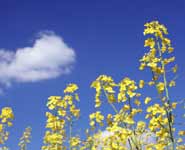Dr Sean Rands, Lecturer in the University’s School of Veterinary Sciences and co-author of the study, said: “Many of the insects that provide essential pollination services to our crop species live very close to where they do their work. Preserving these wild stretches of fields may be an important part of ensuring that we get a decent yield of flowering crop species.”
The study used a mixture of mathematical simulations and data from the British landscape to show that adding a little bit of extra space for these species could provide them with a much more diverse mixture of wild species to forage on, in addition to the crop species available in fields.
Crop species may be hugely abundant when in flower, such as the yellow landscape when oilseed rape is in flower, but once these flowers have passed, the pollinators which live within these fields need to find their supplies elsewhere. Encouraging wild species that flower at different times can provide these essential supplies.
Various species of pollinator may travel very different distances from their home to find food, and what is available to them will depend upon how far they are willing to fly from their homes. This study demonstrates that increasing the width of wild margins should enhance the availability of these off-season resources for all but the most local of species.
Paper: Field margins, foraging distances and their impacts on nesting pollinator success, Sean A Rands & Heather M Whitney, PLoS One, 6(10): e25971.
